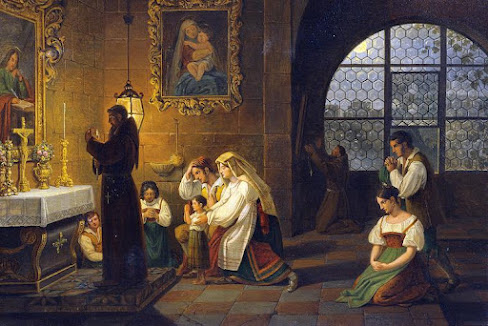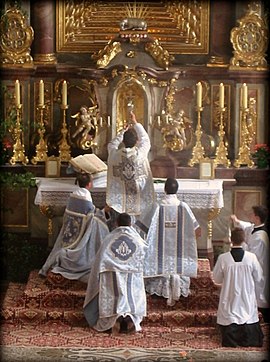A Few Personal Thoughts About the Importance of "Ritual"
The Importance of Ritual
At first glance, one may look at Catholicism and, from the outside, it may appear to be a strange concoction of rituals from a long lost era ... something of no need to modern men. Yet, upon deeper reflection, such rituals may be the most important things we partake in all week. How could this be?
To first understand this, we should look at the concept of "ritual" in general. A ritual is an action that is repeated over and over again which has some deeper, intangible meaning behind it. Those rituals that survive over time often become traditions of a culture, family, religion, or country. As Americans, for example, we celebrate the 4th of July by shooting off fireworks, having hotdog eating contests, and gathering with family and friends. And we do this every year. The question one might ask is ... why? Why should we take off work, spend money to shoot it up in smoke, and stuff our faces with unhealthy meats?
The key to understanding the importance of ritual is the fact that the most important aspects of our lives are not physical or tangible realities that we can hold in our hands. Our identity as a person, family, community, culture, country, and religion, is defined by the beliefs we hold about the nature of the universe, about the nature of human beings, about how a country should function, what the purpose of life is, and by the memories of events that have long past us in the present here and now. We cannot touch these things, we cannot experience them as those who lived during their time. And so to return to our example, the fireworks represent the bombs and canons used in fighting for our freedom, the hotdog eating and gatherings with family and friends also give tangible expression to our country of self-governance. We cannot return to 1776, but we can bring these memories into our minds through these rituals.
And so rituals are a bridge between the intangible beliefs, events, and realities that shape our identity and the present here and now. They are tangible symbols of intangible realities. It is human nature to forget these intangible realities because we can get caught up in our day to day existence and problems. And so in pausing our day to day life, and doing something which is not geared toward any utilitarian use, but rather symbolizes our deepest beliefs and most cherished memories, we are most fully human, and we most fully embody our identity.
And so to return to the discussion of ritual in relation to Christianity, one can now see their importance. As time progresses, we get farther and farther from the events that shaped our world, God becoming man in Christ Jesus. We don't have the privilege of meeting Jesus in person, or dining with him. But we do have the rituals of the Church, the Sacraments and Traditions that have been acted out and passed on since the time of Jesus and the Apostles. These religious rituals are a bridge back in time. For example, Jesus taught and commanded the Apostles to celebrate the Eucharist at the Last Supper. Those Apostles then founded parishes across the Roman empire and taught others how to celebrate it. The next generation did the same, and so and so forth until today in 2022.
When we step into a Mass, we may be confused by the rituals, or the setting, or the language or music ... but that is because we are living something from the distant past. And so, of course, it will go against our modern day sensibilities of what is "entertaining," or "fun," or "relevant," or "cool." But that's exactly the point, it is our connection to the source and root of our deepest beliefs and faith. Thus, these sacramental rituals need to be preserved and protected with minimal tinkering and change. We change these things at our own peril ... the peril of loosing our own past. Now there are those who desire to destroy the past so as to remake Western Civilization into some new Materialist or Marxist image. These people have no use for ritual outside of the utilitarian, outside of serving man's bodily needs. Rather, in destroying them they can strike at the heart of the beliefs which have opposed their own ideologies. If you destroy a man's rituals, you can destroy the man. And so, again, these rituals are a bastion of defense against social-engineering and new scientific "utopias," and thus we are back to the opening line ... they are the most important things we partake in all week.
Now there are those who have criticized the Catholic Mass before the changes of the Second Vatican Council as being too ritualistic and "not easily accessible," and so the emphasis was placed on updating them to make them more easily understood. In doing this, though, I argue that we have done something dangerous. Changing the liturgy to make it more palatable, fun, entertaining, easier on the eyes and ears, are all dangers. Why? Well, just as we said that the core of our identity are things that are not tangible, they are things that are not fully comprehendible - from a historical event, to a loved one, to a set of beliefs - there is always an aspect of mystery that transcends the ability of our intellect to comprehend. Life, at its fundamental core, is a mystery that we are living. There is always some admixture of knowledge with ignorance in everything. And so too our rituals which represent our beliefs must also have an element of mystery to them. The Eastern Catholic Churches, in fact, don't use the word "sacrament," but "mystery," the seven mysteries to express this fact.
One aspect of ritual that conveys this element of mystery is its development over time, even long and forgotten periods of time. There are things that were done in the Mass that didn't make utilitarian sense, but had been part of the handed on tradition of the sacrament. And I believe that this is good! Instead of cutting out things like this, I believe that we need to emphasize them because how much of the past do we really comprehend. The past is so complex that it, itself, remains a mystery to us. And in seeing these rituals from the past be continued into the present gives us a realization of that.
In conclusion, we are moving toward a world that glorifies the utilitarian more and more. Many people are trying to rid the West of its past because then it can be molded into some new image of which they desire. Thus, ritual must be protected. Faith must be protected. The Church must be protected. Just as in many time periods of the past, the Church may be the last stronghold of Western civilization - like Peter's bark floating out on a rough ocean.






Comments
Post a Comment